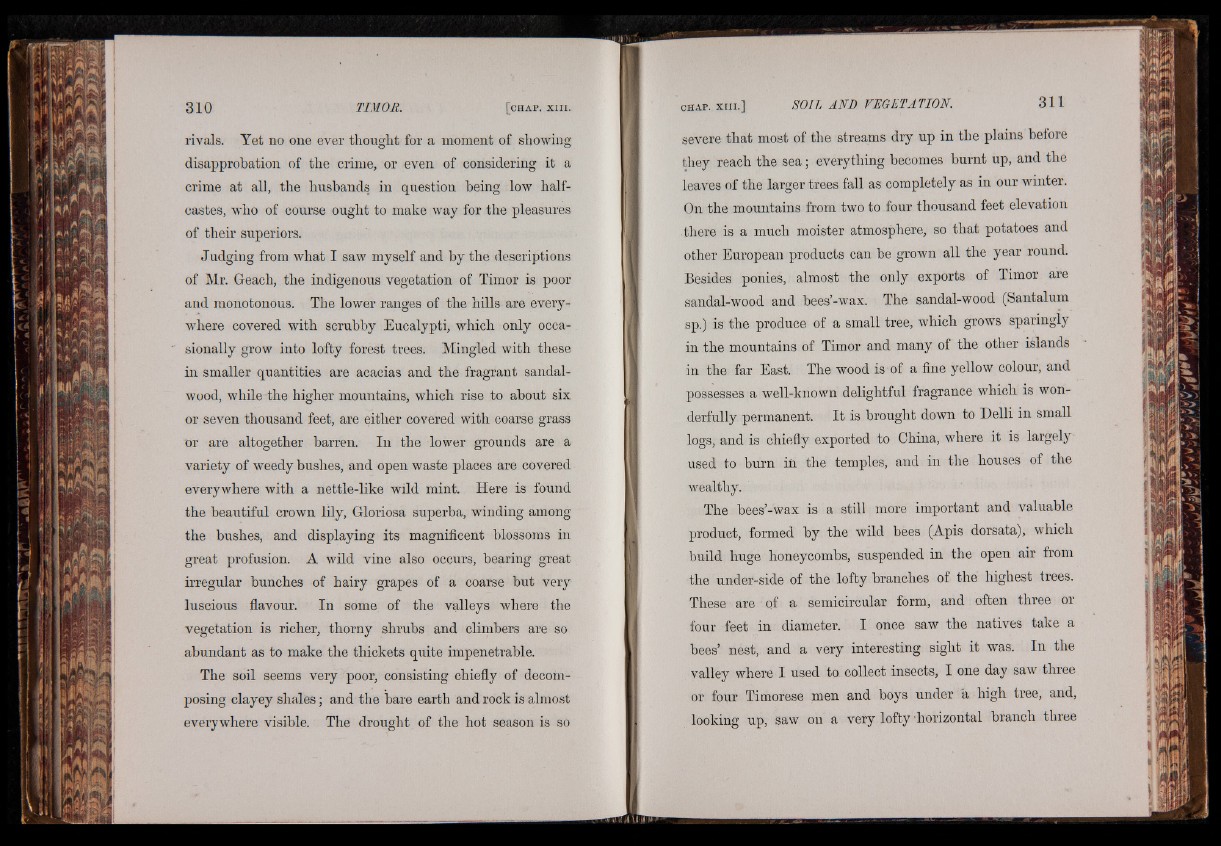
rivals. Yet no one ever thought for a moment of showing
disapprobation of the crime, or even of considering it a
crime at all, the husbands in question being low half-
castes, who of course ought to make way for the pleasures
of their superiors.
Judging from what I saw myself and by the descriptions
of Mr. Geach, the indigenous vegetation of Timor is poor
and monotonous. The lower ranges of the hills are everywhere
covered with scrubby Eucalypti, which only occasionally
grow into lofty forest trees. Mingled with these
in smaller quantities are acacias and the fragrant sandalwood,
while the higher mountains, which rise to about six
or seven thousand feet, are either covered with coarse grass
or are altogether barren. In the lower grounds are a
variety of weedy bushes, and open waste places are covered
everywhere with a nettle-like wild mint. Here is found
the beautiful crown lily, Gloriosa superba, winding among
the bushes, and displaying its magnificent blossoms in
great profusion. A wild vine also occurs, bearing great
irregular bunches of hairy grapes of a coarse but very
luscious flavour. In some of the valleys where the
vegetation is richer, thorny shrubs and climbers are so
abundant as to make the thickets quite impenetrable.
The soil seems very poor, consisting chiefly of decomposing
clayey shales ; and the bare earth and rock is almost
everywhere visible. The drought of the hot season is so
severe that most of the streams dry up in the plains before
they reach the sea; everything becomes burnt up, and the
leaves of the larger trees fall as completely as in our winter.
On the mountains from two to four thousand feet elevation
there is a much moister atmosphere, so that potatoes and
other European products can be grown all the year round.
Besides ponies, almost the only exports of Timor are
sandal-wood and bees’-wax. The sandal-wood (Santalum
sp.) is the produce of a small tree, which grows sparingly
in the mountains of Timor and many of the other islands
in the far East. The wood is of a fine yellow colour, and
possesses a well-known delightful fragrance which is wonderfully
permanent. It is brought down to Delli in small
logs, and is chiefly exported to China, where it is largely
used to burn in the temples, and in the houses of the
wealthy.
The bees’-wax is a still more important and valuable
product, formed by the wild bees (Apis dorsata), which
build huge honeycombs, suspended in the open air from
the under-side of the lofty branches of the highest trees.
These are of a semicircular form, and often three or
four feet in diameter. I once saw the natives take a
bees’ nest, and a very interesting sight it was. In the
valley where I used to collect insects, I one day saw three
or four Timorese men and boys under a high tree, and,
looking up, saw on a very lofty horizontal branch three